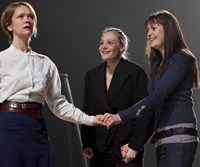SITE GUIDE
SEARCH
REVIEWS
REVIEW ARCHIVES
ADVERTISING AT CURTAINUP
FEATURES
NEWS
Etcetera and
Short Term Listings
LISTINGS
Broadway
Off-Broadway
NYC Restaurants
BOOKS and CDs
OTHER PLACES
Berkshires
London
California
New Jersey
DC
Connecticut
Philadelphia
Elsewhere
QUOTES
TKTS
PLAYWRIGHTS' ALBUMS
LETTERS TO EDITOR
FILM
LINKS
MISCELLANEOUS
Free Updates
Masthead
Writing for Us
A CurtainUp  London Review
London Review
 London Review
London ReviewThree Sisters, Hope Despair and Vodka
|
Father bludgeoned us with education. — Andrei
|

Poppy Miller as Olga, Romola Garai as Masha and Clare Dunne as Irina (Helen Maybanks) |
The scene set in the opening act where they are celebrating the youngest daughter, Irina's (Irish actor Clare Dunne) name day seems tedious but it is going to get worse. For Masha (Romola Garai) married to a much older man, a pedantic Latin quoting schoolmaster, it is boredom which weighs her down as well as his infuriating forgiveness. For Olga (Poppy Miller) it is the routine of her life as a school mistress and the advent of her inevitable, childless spinsterhood. For their brother Andrei (Ferdy Roberts) his infatuation with the dreadful Natasha (Gemma Saunders) will bring marriage, children, adultery and humiliation instead of the academic career he craves, and the happiness he hopes for when he proposes to Natasha.
All the elements are there in this bare staged, post modernist production with the functional sound decks on show and stage hands taking the odd walk on role. There is modern music and white noise to convey the passing of time. In modern dress, or rather a mish mash of ancient and modern costume, it doesn't matter what things look like because what is important here is what people feel. And this is where Filter's production scores highly. All the family are balanced, well intentioned characters with weaknesses that are merely foibles. No-one except Natasha is villified (although maybe the Doctor (Nigel Cooke) is the least appealing with his drunken behaviour). And even then it is Natasha's treatment of the old servant Anfisa (Sandra Voe) that produces a sharp intake of breath from the audience at the shocking disregard she has for the feelings of the loyal, old servant. In other productions Andrei can appear selfish too but Ferdy Roberts changes that. His Andrei is very human, not an unkind brother but as much a victim of his greedy wife, as his sisters are. The scene when Andrei tries to soothe Natasha is played off stage, with the audience eavesdropping on the ridiculous coo-cooing words, not something any of us would want overheard. This directorial device gives the audience the same experience as the other players in the dining room. We share the emotion and the distance from it as outsiders.
Vasily Solynov (Mark Theodore) who, in a duel, will ruin the compromise choice Irina makes, is portrayed as an obsessive, trying to remove "the smell of death on his hands" with the frequent use of a hand sanitiser. Like someone with an annoying personality condition, throughout the party he chucks peanuts at his rival Tuzenbach (Jonathan Broadbent). Poppy Miller's serious Olga keeps the family together while Masha falls for Vershinin (John Lightbody), again someone trapped in unhappiness by circumstance rather than a philanderer as he is sometimes played. During the play we see Irina age visibly and Clare Dunne is never cloying but sincere. Her decision to marry the Baron is pragmatic as she confesses she has never been in love in her life.
Romola Garai as Masha parting from her lover Vershinin is heart rending. Her performance is very still and all the stronger and more affecting for that, as a beauty, she sits and waits, or lies on the bed in the attic, exhausted after her efforts in helping during the fire. I very much liked the final scene when Masha takes the hands of her sisters after those speeches about the present being hideous and manages to find a note of optimism, in the hope that their sufferings will contribute to the happiness of those who will come after them.
Filter's Three Sisters, with some amazing performances, captures the essence of Chekhov with a freshness of purpose.
|
Subscribe to our FREE email updates with a note from editor Elyse Sommer about additions to the website -- with main page hot links to the latest features posted at our numerous locations. To subscribe,
E-mail: esommer@curtainup.comesommer@curtainup.com
put SUBSCRIBE CURTAINUP EMAIL UPDATE in the subject line and your full name and email address in the body of the message -- if you can spare a minute, tell us how you came to CurtainUp and from what part of the country. |
| Three Sisters, Hope Despair and Vodka
Written by Anton Chekhov In a aversion by Christopher Hampton Directed by Sean Holmes and Filter Starring: Romola Garai, Poppy Miller, Ferdy Roberts, John Lightfoot, Clare Dunne With: Paul Brennen, Jonathan Broadbent, Jim Bywater, Nigel Cooke, David Judge, Gemma Saunders, Mark Theodore, Sandra Voe, Paul Woodson Design: Jon Bausor Lighting: Paule Constable Composer and Sound: Chris Branch Running time: Two hours 45 minutes with one interval Box Office: 0871 2211729 Booking to 20th February 2010 Reviewed by Lizzie Loveridge based on 25th January 2010 performance at the Lyric Theatre, King Street, Hammersmith, London W6 0QL (Tube:Hammersmith) |
|
REVIEW FEEDBACK Highlight one of the responses below and click "copy" or"CTRL+C"
Paste the highlighted text into the subject line (CTRL+ V): Feel free to add detailed comments in the body of the email . . . also the names and emails of any friends to whom you'd like us to forward a copy of this review. |
|
London Theatre Tickets Lion King Tickets Billy Elliot Tickets Mighty Boosh Tickets Mamma Mia Tickets We Will Rock You Tickets Theatre Tickets |




